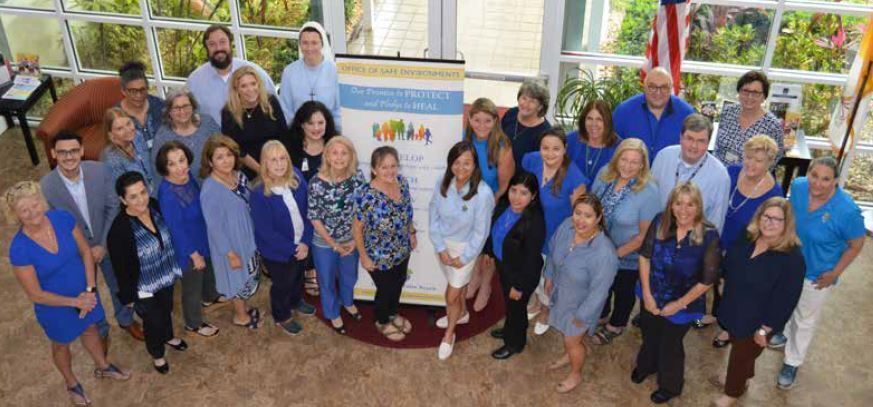
PALM BEACH GARDENS | The system is working, said Lisa Linnell and Kathy Casey of the diocesan Office of Safe Environments. Abuse cases have been all but eliminated in the Catholic Church through adherence to the “Charter for the Protection of Children and Young People” and “Essential Norms” set up 21 years ago by the bishops of the United States.
Linnell, administrator of education and training, said the only current issues involve understanding and following boundary policies, and even those are being reported. Casey, administrator of background screening, said most people know enough to report problems when they see them.
In the past year, the diocese facilitated another in-person visit to parishes and schools by auditors to make sure policies and procedures are being followed. “We have to have all the paperwork from parishes and schools, everything submitted by August, and then they start visiting,” Casey said.
After the auditors’ visit, which was in October, their report usually finds some issues that need to be addressed, Linnell and Casey said.
Because the Safe Environments Office is efficient and attentive, Linnell said, the staff usually knows if a staff or volunteer background check is due for an update.
Casey added, “We do have really good people in our parishes. They don’t ignore us. They call us back. We send out the audit, they do it and they send it back. Other dioceses tell us they never even get their response.”
“It’s a huge job to keep track of every single volunteer,” Linnell said. “I give credit to our people out in the field because they’re the ones who do the work.”
Both women attended a nationwide meeting of diocesan safe environment administrators in April where they could communicate with their counterparts. “It’s interesting because every diocese does it differently, but we all deal with the same issues, all the same problems,” Casey said.
Besides being a relatively small and young diocese, the Diocese of Palm Beach is blessed that, “in 2002, when the charter came out and this diocese set everything up, they set it up right,” she said. “They wrote a program and a database. We made it centralized from the beginning. A lot of other dioceses don’t have it centralized.”
The Safe Environments Office hosted four live training sessions in March for abuse policy compliance administrators in the diocese. For several years, the meetings had been held online because of the pandemic.
“We just go over everything and answer their questions. It’s good to get to see everyone,” Casey said.
Diocesan policy is for all employees to be trained in abuse prevention, not just the individuals who have regular contact with children. Since 2002, all employees have gone through background screening and fingerprinting.
In Florida, any person who knows or has reasonable cause to suspect that a child is abused, neglected or abandoned by a parent, legal custodian, caregiver or other person responsible for the child’s welfare is required to report it. The motto, “If you see something, say something,” is the same for abuse against children and vulnerable adults.
Those who work with vulnerable adults — classified as someone older than 18 whose ability to perform normal activities of daily living is impaired due to a mental, emotional, long-term physical or developmental disability, or the infirmities of aging — are advised on what to look out for, what to do and what not to do. Any Catholic Church employee or volunteer ministering in homes, hospitals and nursing facilities participate in a separate, similar training program.
“The thing we like about the vulnerable adult training is that it’s not just for our people who service the vulnerable,” Casey said. “It’s for yourself, too, because it opens your eyes. I had one person tell me, ‘I didn’t even know I could be groomed as an elder adult.’ They don’t even realize.”
An important aspect of preventing abuse is teaching students in Catholic schools and parish religious education programs how to stay safe. The Virtus Empowering God’s Children program is taught to minors, supplemented by the NetSmartz and KidSmartz online education programs from the National Center for Missing and Exploited Children, which is based in Palm Beach Gardens.
“The National Center for Missing and Exploited Children has incredible resources to help with issues involving cellphone use, internet gaming, material for parents, every age group,” Linnell said. Parents are encouraged to visit the center’s website (www.missingkids.org) to get informed about the latest threats against minors.
The partnership between the national center and the diocese is one example of how abuse prevention has improved. Gone are the days when a group of Catholic parents would casually decide to organize a sports competition without any institutional oversight or thought about child safety.
“Seeing all our people really think that through is cool,” Linnell said. “They think, ‘OK, we got to make sure we’re following all the guidelines and keep people safe.’”
For more information on the diocese’s Office of Safe Environments, visit https://www.diocesepb.org/ministriesoffices/offices/safe-environments/.

